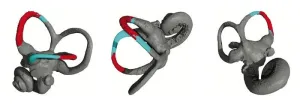(Press-News.org) A new qualitative study highlights the negative interpersonal and psychological consequences associated with “yo-yo dieting,” also known as weight cycling. The work underscores how toxic yo-yo dieting can be and how difficult it can be for people to break the cycle.
“Yo-yo dieting – unintentionally gaining weight and dieting to lose weight only to gain it back and restart the cycle – is a prevalent part of American culture, with fad diets and lose-weight-quick plans or drugs normalized as people pursue beauty ideals,” says Lynsey Romo, corresponding author of a paper on the study and an associate professor of communication at North Carolina State University.
“Based on what we learned through this study, as well as the existing research, we recommend that most people avoid dieting, unless it is medically necessary. Our study also offers insights into how people can combat insidious aspects of weight cycling and challenge the cycle.”
For the study, researchers conducted in-depth interviews with 36 adults – 13 men and 23 women – who had experienced weight cycling where they lost and regained more than 11 pounds. The goal was to learn more about why and how people entered the yo-yo dieting cycle and how, if at all, they were able to get out of it.
All the study participants reported wanting to lose weight due to social stigma related to their weight, and/or because they were comparing their weight to that of celebrities or peers.
“Overwhelmingly, participants did not start dieting for health reasons, but because they felt social pressure to lose weight,” Romo says.
The study participants also reported engaging in a variety of weight-loss strategies, which resulted in initial weight loss, but eventual regain.
Regaining the weight led people to feel shame and further internalize stigma associated with weight – leaving study participants feeling worse about themselves than they did before they began dieting. This, in turn, often led people to engage in increasingly extreme behaviors to try to lose weight again.
“For instance, many participants engaged in disordered weight management behaviors, such as binge or emotional eating, restricting food and calories, memorizing calorie counts, being stressed about what they were eating and the number on the scale, falling back on quick fixes (such as low-carb diets or diet drugs), overexercising, and avoiding social events with food to drop pounds fast,” says Romo. “Inevitably, these diet behaviors became unsustainable, and participants regained weight, often more than they had initially lost.”
“Almost all of the study participants became obsessed with their weight,” says Katelin Mueller, co-author of the study and graduate student at NC State. “Weight loss became a focal point for their lives, to the point that it distracted them from spending time with friends, family, and colleagues and reducing weight-gain temptations such as drinking and overeating.”
“Participants referred to the experience as an addiction or a vicious cycle,” Romo says. “Individuals who were able to understand and address their toxic dieting behaviors were more successful at breaking the cycle. Strategies people used to combat these toxic behaviors included focusing on their health rather than the number on the scale, as well as exercising for fun, rather than counting the number of calories they burned.
“Participants who were more successful at challenging the cycle were also able to embrace healthy eating behaviors – such as eating a varied diet and eating when they were hungry – rather than treating eating as something that needs to be closely monitored, controlled or punished.”
However, the researchers found the vast majority of study participants stuck in the cycle.
“The combination of ingrained thought patterns, societal expectations, toxic diet culture, and pervasive weight stigma make it difficult for people to completely exit the cycle, even when they really want to,” Romo says.
“Ultimately, this study tells us that weight cycling is a negative practice that can cause people real harm,” Romo says. “Our findings suggest that it can be damaging for people to begin dieting unless it is medically necessary. Dieting to meet some perceived societal standard inadvertently set participants up for years of shame, body dissatisfaction, unhappiness, stress, social comparisons, and weight-related preoccupation. Once a diet has begun, it is very difficult for many people to avoid a lifelong struggle with their weight.”
The paper, “A Qualitative Model of Weight Cycling,” is published in the journal Qualitative Health Research. The paper was co-authored by Sydney Earl, a Ph.D. student at NC State; and by Mary Obiol, an undergraduate at NC State.
END
Study urges people to think twice before going on a diet
2024-01-29
ELSE PRESS RELEASES FROM THIS DATE:
Astronomers spot 18 black holes gobbling up nearby stars
2024-01-29
Star-shredding black holes are everywhere in the sky if you just know how to look for them. That’s one message from a new study by MIT scientists, appearing today in the Astrophysical Journal.
The study’s authors are reporting the discovery of 18 new tidal disruption events (TDEs) — extreme instances when a nearby star is tidally drawn into a black hole and ripped to shreds. As the black hole feasts, it gives off an enormous burst of energy across the electromagnetic spectrum.
Astronomers have detected previous tidal disruption events by looking for characteristic bursts in the optical and X-ray bands. To date, these searches have ...
The DiAL-Health study will help determine how intermittent fasting and calorie counting can improve a person’s “healthspan”
2024-01-29
January is a time when many people are looking for new diet routines, and intermittent fasting is trending, as are traditional calorie cutting programs.
Research conducted with animal models suggests that intermittent fasting slows aging, and those animals live longer. Researchers at the Pennington Biomedical Research Center and the University of Alabama at Birmingham are conducting the DiAL-Health study to see if eating for 8 hours and fasting for 16 each day shows similar results in people. These researchers ...
From simulation to reality: Making social media a safer space for kids through AI
2024-01-29
Like it or not, social media has become the new mall for kids. It’s where they want to be, and it’s a place they can easily go—often with no guidance, no oversight, and no guardrails. And when the content gets ugly or confusing or weird, it can be tough for them to know what to do.
Dominic DiFranzo, an assistant professor of computer science and engineering in Lehigh University’s P.C. Rossin College of Engineering and Applied Science, has devoted his research to helping kids better navigate the perils of social media. He and his team have recently received two grants from the National Science Foundation to develop artificial intelligence tools ...
Shah studying fingerprinting technology for enhancing 5G/NextG O-RAN supply chain risk management
2024-01-29
Vijay Shah, Assistant Professor, Cybersecurity Engineering, received funding for the project: "Fingerprinting Technology for Enhancing 5G/NextG O-RAN Supply Chain Risk Management."
In this project, Shah is focusing on distinctive power signatures and electromagnetic emanations to fortify supply chain risk management of 5G/Next G networks.
This technology has the potential to create a robust framework for comprehensive validation and testing across the entire lifespan of deployed Open Radio Access Network (O-RAN) systems. This, in turn, could ...
From Baby Boomers to Gen Alpha – Is it time to stop talking about generations?
2024-01-29
'Millennials don't really want to work. They're far too focused on avocado toast and chai lattes!' Just one of the many clichés expressed by workers over the age of fifty. And those being criticized? Well, they often reply with a bored 'OK, Boomer' followed by an eye roll and some ironic remark about the excessively performance-driven worldview of those born between the mid 1950s and the mid 1960s. Work, it seems, just isn't as important to the young as it is to older generations. But it's not just about baby boomers and millennials. Parked between them is Generation X, ...
Destroying tumor cells with calcium
2024-01-29
Calcium ions are essential for cells, but can be toxic in higher concentrations. A team of researchers has now designed and prepared a combination drug that kills tumor cells by modulating the calcium influx into the cell. An external calcium source is not necessary because only the calcium ions already present in the tumor tissue are used, according to the study published in the journal Angewandte Chemie.
Biological cells need calcium ions, among other things, for the proper functioning of the mitochondria, the powerhouses of the cells. However, ...
University of Houston expert warns red light myopia therapy can injure retina
2024-01-29
A University of Houston optometry researcher is warning against the use of low-level red light (LLRL) therapy as a method to control myopia, or nearsightedness, especially in children. Over the last few years, LLRL has emerged as a viable myopia treatment after studies reported the treatment as effective and responsible for significant reduction in myopia progression. The company behind one of the devices reports that it is already being used to address myopia in over 100,000 pediatric patients.
But the excitement over its results as a myopia treatment may have come too soon, ahead of its proven safety.
"Based on measurements in our laboratory, ...
Can science beat counterfeit detector pens? (video)
2024-01-29
WASHINGTON, Jan. 29, 2024 — Counterfeit detector pens use a starch-iodine reaction to identify fake bills. But could you fool them with chemistry? In today’s episode, we dive into the chemistry of iodine, its color and its clock reactions, all while making a little extra cash on the side. https://www.youtube.com/watch?v=xDaVCyOBSsY
Reactions is a video series produced by the American Chemical Society and PBS Digital Studios. Subscribe to Reactions at http://bit.ly/ACSReactions and follow us on Twitter @ACSReactions.
The American Chemical Society (ACS) is a nonprofit organization chartered by the U.S. Congress. ACS’ mission is to advance the broader ...
How did humans learn to walk? New evolutionary study offers an earful
2024-01-29
Humans and our closest relatives, living apes, display a remarkable diversity of types of locomotion—from walking upright on two legs to climbing in trees and walking using all four limbs.
While scientists have long been intrigued by the question of how humans’ bipedal stance and movement evolved from a quadrupedal ancestor, neither past studies nor fossil records have permitted the reconstruction of a clear and definitive history of the early evolutionary stages that led to human bipedalism.
However, a new study, which centers on recently discovered evidence from skulls of a 6-million-year-old fossil ape, Lufengpithecus, ...
Alzheimer’s disease acquired from historic medical treatments
2024-01-29
Five cases of Alzheimer’s disease are believed to have arisen as a result of medical treatments decades earlier, reports a team of UCL and UCLH researchers.
Alzheimer’s disease is caused by the amyloid-beta protein, and is usually a sporadic condition of late adult life, or more rarely an inherited condition that occurs due to a faulty gene. The new Nature Medicine paper provides the first evidence of Alzheimer’s disease in living people that appears to have been medically acquired and due to transmission of the amyloid-beta protein.
The people described in the paper had all been treated as ...






